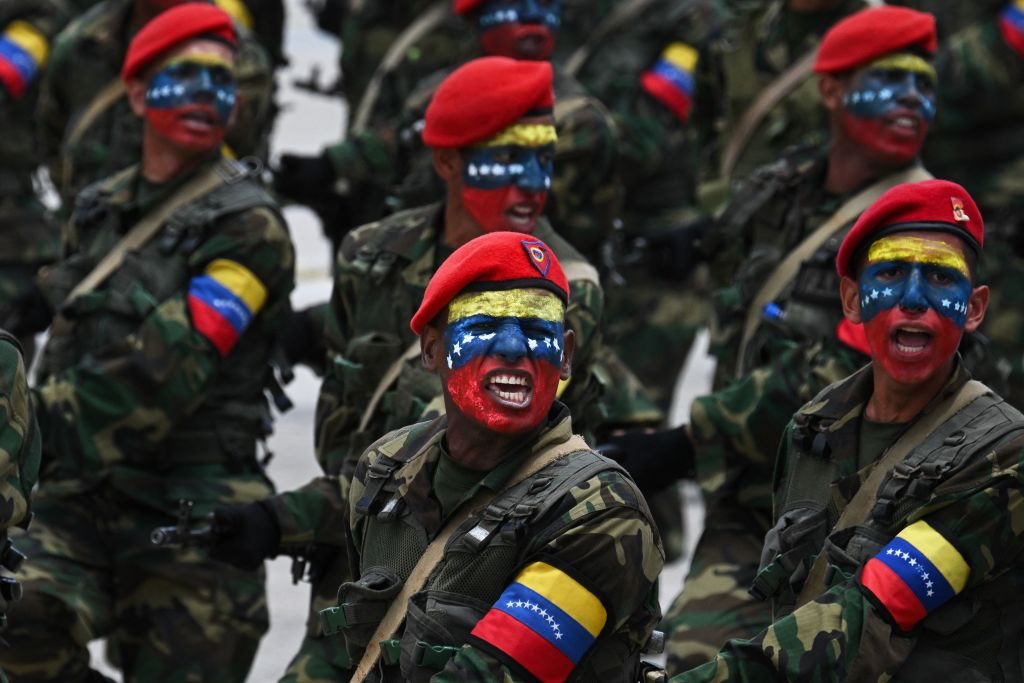On Sunday, US Secretary of State Marco Rubio announced that the United States will designate Cartel de los Soles, which he says is headed by Venezuelan president Nicholas Maduro, as a Foreign Terrorist Organization (FTO). It’s one of the clearest signals that the Trump administration wants to preserve the option of direct military strikes against Maduro’s government, even as the administration continues to send mixed signals about the possibility of a diplomatic détente.
In the New York Times, Bret Stephens argues that the confrontation with Venezuela should be escalated to full regime change. But, what could possibly justify such an extreme step? And how can Stephens think it would be less of a catastrophe than previous regime change wars?
Certainly, the administration’s official rationale for intervention is paper thin. “Cartel de los Soles” (“cartel of the suns”) is a colloquial term used by journalists and think-tankers since the Nineties to refer to allegations of drug-running in the Venezuelan military. It was coined because of the sun insignias on the uniforms of Venezuelan officers. That wouldn’t add up to a single literal “cartel” with a vertical structure and a “head”. And the administration’s claim that Venezuelan drug trafficking leads to vast numbers of fentanyl overdoses in the US is nonsense. A small portion of the cocaine in the US comes from Venezuela, and approximately none of the fentanyl.
Stephens offers two additional justifications. Venezuela is an “importer” of instability due to its relationships with countries like Russia and China, and an “exporter” of instability due to the outflow of Venezuelan refugees and migrants. But, if superpowers have a right to intervene when countries in their spheres of influence become too close to their geopolitical rivals, why isn’t Putin’s war in Ukraine justified? As for the second rationale, judging by the precedents of Iraq, Afghanistan, and Libya, the predictable effect of a regime change war would be a dramatic increase in the number of Venezuelans looking to leave their country.
In general, advocates of regime change have a hard time shirking the obvious analogy to Bush’s wars in the Middle East. Why should we believe Venezuela is less likely to descend into instability and bloodshed?
The country has a long history of guerrilla warfare, going back to peasant revolts in the 19th century and continuing with the armed struggles waged by groups like the FALN (“Armed Forces of National Liberation”) in the aftermath of the Cuban Revolution. The Venezuelan military shows no real sign of wavering in its loyalty to Maduro, and even Stephens acknowledges the possibility that, even after being defeated, the army might “retreat to the hinterland and start an insurgency” perhaps by linking with Columbia’s FARC (“Revolutionary Armed Forces of Columbia”). He raises this possibility only to shrug it off on the grounds that possible unintended consequences can’t stack up against the danger of emboldening an anti-US regime by backing off. But, what he’s describing sounds like a Latin American sequel to the Vietnam War.
If Trump listens to the regime-change advocates, Americans could end up dying in Venezuela. Stephens avers that this won’t happen because of “Trump’s clear reluctance to put U.S. boots on the ground for any extended period”. But, does anyone doubt that if Trump cut and ran in a hurry, the Bret Stephenses of the world would be as furious at him as they were at Biden when he finally withdrew from Afghanistan after 20 years of war?
Advocates of regime change always say the next war will be different. It’s long past time for the rest of us to stop listening.











Join the discussion
Join like minded readers that support our journalism by becoming a paid subscriber
To join the discussion in the comments, become a paid subscriber.
Join like minded readers that support our journalism, read unlimited articles and enjoy other subscriber-only benefits.
Subscribe